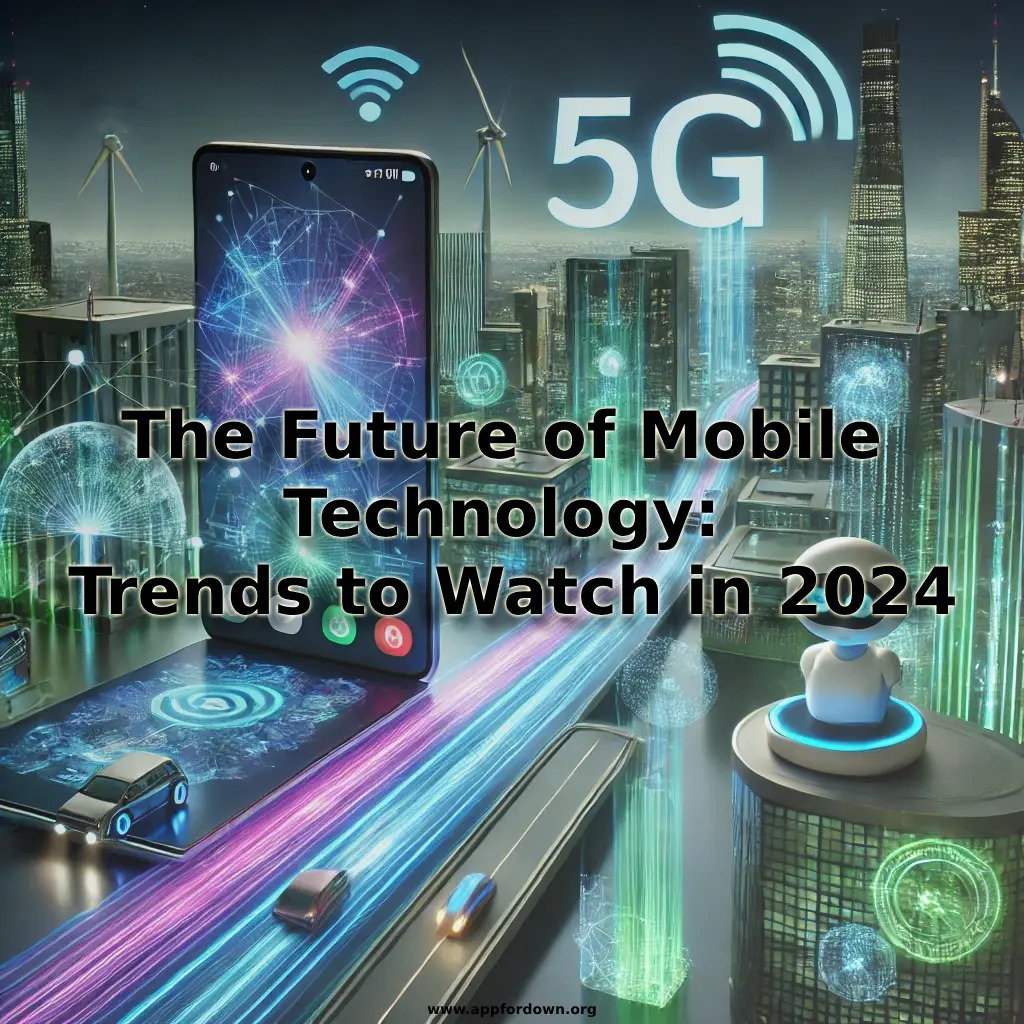Mobile technology constantly evolves, bringing innovations and trends that shape how we interact with the world. As we step into 2024, several key trends are emerging that promise to redefine our mobile experience. From the widespread adoption of 5G to the integration of AI in everyday tasks and the rise of foldable devices, the future of mobile technology is brighter and more exciting than ever. This blog post will explore these trends and what they mean for consumers and the industry.

The 5G Revolution: Connecting the World Faster
5G technology has been a hot topic for several years, but 2024 is the year when it truly takes off. With more countries rolling out 5G networks and more devices supporting this next-generation connectivity, the benefits of 5G will become more accessible to the average consumer.
5G offers significantly faster data speeds, lower latency, and the ability to connect more devices simultaneously. This will enhance the user experience in areas like streaming, gaming, and video conferencing and open up new possibilities for smart cities, autonomous vehicles, and the Internet of Things (IoT). The widespread adoption of 5G is expected to drive innovation across various industries, leading to more connected and efficient systems.
5G means faster downloads, smoother streaming, and better overall mobile experiences for consumers. It’s also likely to reduce the digital divide, providing faster internet access in rural and underserved areas. As 5G becomes the standard, we can expect new applications and services that utilize its capabilities, from augmented reality (AR) experiences to real-time remote healthcare.
AI Integration: Making Devices Smarter
Artificial Intelligence (AI) is no longer just a buzzword; it’s becoming an integral part of mobile technology. In 2024, we can expect AI to be even more deeply integrated into our devices, enhancing their capabilities and making our lives easier.
One of the most significant areas where AI is making an impact is personalization. AI algorithms are becoming more adept at understanding user behaviour, preferences, and habits, allowing devices to offer more personalized experiences. Whether recommending the next song on your playlist, optimizing battery usage based on your daily routine, or providing real-time language translation, AI is making our devices more intelligent and intuitive.
Moreover, AI-powered virtual assistants like Siri, Google Assistant, and Alexa are becoming more sophisticated, offering more natural and context-aware interactions. In 2024, we can expect these assistants to play an even more prominent role in our daily lives, from managing our schedules to controlling smart home devices.
AI is also set to revolutionize healthcare, finance, and retail industries by enabling more accurate predictions, automating routine tasks, and improving decision-making processes. For instance, AI-powered diagnostic tools can help doctors detect diseases earlier. At the same time, AI-driven financial apps can offer personalized investment advice.
The Rise of Foldable Devices: A New Era of Mobile Design
Foldable devices have been on the market for a few years, but 2024 is shaping up to be the year they come into their own. As technology improves and prices become more competitive, foldable smartphones and tablets are set to become mainstream.
Foldable devices offer a unique combination of portability and functionality. When folded, they function like a regular smartphone. Still, they provide a larger screen when unfolding, making them ideal for multitasking, gaming, and media consumption. This flexibility is particularly appealing in a world where users demand more from their devices, whether for work, entertainment, or creativity.
Manufacturers are also exploring new form factors and materials, making foldable devices more durable and user-friendly. We can expect more innovations in this space, such as devices that fold in multiple directions, rollable screens, and hybrid devices that blur the lines between smartphones, tablets, and laptops.
For consumers, foldable devices represent a significant shift in mobile design, offering a glimpse into the future of how we interact with technology. As these devices become more affordable and widely available, they have the potential to replace traditional smartphones and tablets, offering a more versatile and immersive experience.
Enhanced Mobile Security: Protecting Your Data
As mobile technology advances, so do the threats to our data and privacy. In 2024, mobile security is expected to be a top priority for consumers and manufacturers. With more sensitive information being stored and transmitted on mobile devices, protecting this data is more critical than ever.
One of the key trends in mobile security is biometric authentication, such as fingerprint scanning and facial recognition. These technologies are becoming more sophisticated and reliable, offering a higher security level than traditional passwords. In addition, AI-driven security measures can detect and respond to threats in real-time, providing an added layer of protection.
Another significant development is the increasing use of end-to-end encryption for communications and data storage. As privacy concerns continue to grow, more apps and services are adopting encryption to protect user data from unauthorized access.
For consumers, these advancements mean greater peace of mind when using their mobile devices for online banking, shopping, and communication. However, it’s also important to stay vigilant and adopt reasonable security practices, such as using strong passwords, enabling two-factor authentication, and keeping software up to date.
Sustainability and Eco-Friendly Devices
With growing awareness of environmental issues, sustainability is becoming a key consideration in the design and production of mobile devices. In 2024, we expect to see more manufacturers adopting eco-friendly practices, from using recycled materials to reducing energy consumption.
One of the most significant trends in this area is the push for longer-lasting devices. As consumers become more conscious of electronic waste, there is a growing demand for devices built to last, with replaceable components and extended software support. This reduces the environmental impact of manufacturing new devices and saves consumers money in the long run.
Additionally, manufacturers are exploring ways to make their production processes more sustainable, such as reducing harmful chemicals, minimizing waste, and adopting renewable energy sources. Some companies are also taking steps to offset their carbon emissions, making their products more environmentally friendly.
For consumers, choosing eco-friendly devices means supporting companies prioritizing sustainability and reducing their environmental footprint. As this trend continues to grow, we expect to see more options for green mobile technology in the market.

Conclusion: A Bright Future Ahead
The future of mobile technology in 2024 is filled with exciting possibilities. From the widespread adoption of 5G and AI integration to the rise of foldable devices and enhanced mobile security, these trends are set to transform how we use and interact with our mobile devices. As technology continues to evolve, consumers must stay informed and embrace these changes, ensuring they make the most of the innovations shaping our world.
Whether you’re a tech enthusiast or just someone who relies on your smartphone for everyday tasks, there’s no denying that 2024 will be an exciting year for mobile technology. By staying ahead of the trends and understanding how they impact your life, you can be better prepared to navigate the future of mobile tech.







